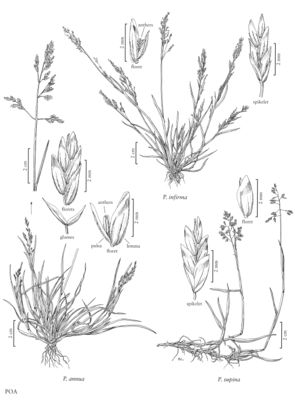Difference between revisions of "Poa annua"
FNA>Volume Importer |
FNA>Volume Importer |
||
| Line 7: | Line 7: | ||
|synonyms={{Treatment/ID/Synonym | |synonyms={{Treatment/ID/Synonym | ||
|name=Poa annua var. reptans | |name=Poa annua var. reptans | ||
| − | |authority= | + | |authority= |
| + | |rank=variety | ||
}} {{Treatment/ID/Synonym | }} {{Treatment/ID/Synonym | ||
|name=Poa annua var. aquatica | |name=Poa annua var. aquatica | ||
| − | |authority= | + | |authority= |
| + | |rank=variety | ||
}} | }} | ||
|hierarchy=Poaceae;Poaceae subfam. Pooideae;Poaceae tribe Poeae;Poa;Poa subg. Poa;Poa sect. Micrantherae;Poa annua | |hierarchy=Poaceae;Poaceae subfam. Pooideae;Poaceae tribe Poeae;Poa;Poa subg. Poa;Poa sect. Micrantherae;Poa annua | ||
| Line 23: | Line 25: | ||
-->{{Treatment/Body | -->{{Treatment/Body | ||
|distribution=Conn.;N.J.;N.Y.;Wash.;Va.;Mich.;Del.;D.C;Wis.;Alta.;B.C.;Greenland;Man.;N.B.;Nfld. And Labr.;N.S.;N.W.T.;Ont.;P.E.I.;Que.;Sask.;Yukon;W.Va.;Pacific Islands (Hawaii);Mass.;Maine;N.H.;R.I.;Vt.;Fla.;Wyo.;N.Mex.;Tex.;La.;Tenn.;N.C.;S.C.;Pa.;Calif.;Nev.;Puerto Rico;Colo.;Md.;Alaska;Ala.;Kans.;N.Dak.;Nebr.;Okla.;S.Dak.;Ark.;Ill.;Ga.;Ind.;Iowa;Ariz.;Idaho;Mont.;Oreg.;Ohio;Utah;Mo.;Minn.;Miss.;Ky. | |distribution=Conn.;N.J.;N.Y.;Wash.;Va.;Mich.;Del.;D.C;Wis.;Alta.;B.C.;Greenland;Man.;N.B.;Nfld. And Labr.;N.S.;N.W.T.;Ont.;P.E.I.;Que.;Sask.;Yukon;W.Va.;Pacific Islands (Hawaii);Mass.;Maine;N.H.;R.I.;Vt.;Fla.;Wyo.;N.Mex.;Tex.;La.;Tenn.;N.C.;S.C.;Pa.;Calif.;Nev.;Puerto Rico;Colo.;Md.;Alaska;Ala.;Kans.;N.Dak.;Nebr.;Okla.;S.Dak.;Ark.;Ill.;Ga.;Ind.;Iowa;Ariz.;Idaho;Mont.;Oreg.;Ohio;Utah;Mo.;Minn.;Miss.;Ky. | ||
| − | |discussion=<p>Poa annua is one of the world's most widespread weeds. It thrives in anthropomorphic habitats outside of the arctic. A native of Eurasia, it is now well established throughout most of the Flora region.</p><!-- | + | |discussion=<p><i>Poa annua</i> is one of the world's most widespread weeds. It thrives in anthropomorphic habitats outside of the arctic. A native of Eurasia, it is now well established throughout most of the Flora region.</p><!-- |
| − | --><p>Poa annua is a gynomonoecious tetraploid (possibly rarely polyhaploid), and is thought to have arisen from hybridization between P. infirma (see next) and P. supina (p. 521) (Tutin 1952). It is similar to P. infirma, differing in having larger anthers. It differs from P. chapmaniana (p. 534) in having glabrous calluses and three larger anthers, rather than one. Forms with glabrous lemmas occur sporadically within populations.</p> | + | --><p><i>Poa annua</i> is a gynomonoecious tetraploid (possibly rarely polyhaploid), and is thought to have arisen from hybridization between <i>P. infirma</i> (see next) and <i>P. supina</i> (p. 521) (Tutin 1952). It is similar to <i>P. infirma</i>, differing in having larger anthers. It differs from <i>P. chapmaniana</i> (p. 534) in having glabrous calluses and three larger anthers, rather than one. Forms with glabrous lemmas occur sporadically within populations.</p> |
|tables= | |tables= | ||
|references= | |references= | ||
| Line 33: | Line 35: | ||
-->{{#Taxon: | -->{{#Taxon: | ||
name=Poa annua | name=Poa annua | ||
| − | |||
|authority=L. | |authority=L. | ||
|rank=species | |rank=species | ||
| Line 41: | Line 42: | ||
|family=Poaceae | |family=Poaceae | ||
|illustrator=Sandy Long | |illustrator=Sandy Long | ||
| + | |illustration copyright=Utah State University | ||
|distribution=Conn.;N.J.;N.Y.;Wash.;Va.;Mich.;Del.;D.C;Wis.;Alta.;B.C.;Greenland;Man.;N.B.;Nfld. And Labr.;N.S.;N.W.T.;Ont.;P.E.I.;Que.;Sask.;Yukon;W.Va.;Pacific Islands (Hawaii);Mass.;Maine;N.H.;R.I.;Vt.;Fla.;Wyo.;N.Mex.;Tex.;La.;Tenn.;N.C.;S.C.;Pa.;Calif.;Nev.;Puerto Rico;Colo.;Md.;Alaska;Ala.;Kans.;N.Dak.;Nebr.;Okla.;S.Dak.;Ark.;Ill.;Ga.;Ind.;Iowa;Ariz.;Idaho;Mont.;Oreg.;Ohio;Utah;Mo.;Minn.;Miss.;Ky. | |distribution=Conn.;N.J.;N.Y.;Wash.;Va.;Mich.;Del.;D.C;Wis.;Alta.;B.C.;Greenland;Man.;N.B.;Nfld. And Labr.;N.S.;N.W.T.;Ont.;P.E.I.;Que.;Sask.;Yukon;W.Va.;Pacific Islands (Hawaii);Mass.;Maine;N.H.;R.I.;Vt.;Fla.;Wyo.;N.Mex.;Tex.;La.;Tenn.;N.C.;S.C.;Pa.;Calif.;Nev.;Puerto Rico;Colo.;Md.;Alaska;Ala.;Kans.;N.Dak.;Nebr.;Okla.;S.Dak.;Ark.;Ill.;Ga.;Ind.;Iowa;Ariz.;Idaho;Mont.;Oreg.;Ohio;Utah;Mo.;Minn.;Miss.;Ky. | ||
|reference=None | |reference=None | ||
| Line 46: | Line 48: | ||
|publication year= | |publication year= | ||
|special status= | |special status= | ||
| − | |source xml=https:// | + | |source xml=https://jpend@bitbucket.org/aafc-mbb/fna-data-curation.git/src/f50eec43f223ca0e34566be0b046453a0960e173/coarse_grained_fna_xml/V24/V24_728.xml |
|subfamily=Poaceae subfam. Pooideae | |subfamily=Poaceae subfam. Pooideae | ||
|tribe=Poaceae tribe Poeae | |tribe=Poaceae tribe Poeae | ||
Revision as of 20:23, 16 December 2019
Plants usually annual, rarely surviving for a second season; not rhizomatous, sometimes stoloniferous, densely tufted. Basal branching intravaginal, innovations common, similar to the culms. Culms 2-20(45) cm, prostrate to erect, slender; nodes terete, usually 1 exserted. Sheaths closed for about 1/3 their length, terete or weakly compressed, smooth; ligules 0.5-3(5) mm, smooth, glabrous, decurrent, obtuse to truncate; blades 1-10 cm long, 1-3(6) mm wide, flat or weakly folded, thin, soft, smooth, margins usually slightly scabrous, apices broadly prow-shaped. Panicles 1-7(10) cm, lengths 1.2-1.6 times widths, erect; nodes with 1-2(3) branches; branches ascending to spreading or reflexed, straight, terete, smooth, with crowded or loosely arranged spikelets. Spikelets 3-5 mm, laterally compressed; florets 2-6; rachilla internodes smooth, glabrous, concealed or exposed, distal internodes less than 1/2(3/4) the length of the distal lemma. Glumes smooth, distinctly keeled, keels smooth; lower glumes 1-veined; upper glumes shorter than or subequal to the lowest lemma; calluses glabrous; lemmas 2.5-4 mm, lanceolate, distinctly keeled, smooth throughout, the keels, marginal veins, and, usually, lateral veins crisply puberulent to long-villous, rarely glabrous throughout, lateral veins prominent, intercostal regions glabrous, margins smooth, glabrous, apices obtuse to acute; palea keels smooth, usually short- to long-villous, rarely glabrous; anthers 0.6-1.1 mm, oblong prior to dehiscence, those of the upper 1-2 florets usually vestigial. 2n = 28.
Distribution
Conn., N.J., N.Y., Wash., Va., Mich., Del., D.C, Wis., Alta., B.C., Greenland, Man., N.B., Nfld. And Labr., N.S., N.W.T., Ont., P.E.I., Que., Sask., Yukon, W.Va., Pacific Islands (Hawaii), Mass., Maine, N.H., R.I., Vt., Fla., Wyo., N.Mex., Tex., La., Tenn., N.C., S.C., Pa., Calif., Nev., Puerto Rico, Colo., Md., Alaska, Ala., Kans., N.Dak., Nebr., Okla., S.Dak., Ark., Ill., Ga., Ind., Iowa, Ariz., Idaho, Mont., Oreg., Ohio, Utah, Mo., Minn., Miss., Ky.
Discussion
Poa annua is one of the world's most widespread weeds. It thrives in anthropomorphic habitats outside of the arctic. A native of Eurasia, it is now well established throughout most of the Flora region.
Poa annua is a gynomonoecious tetraploid (possibly rarely polyhaploid), and is thought to have arisen from hybridization between P. infirma (see next) and P. supina (p. 521) (Tutin 1952). It is similar to P. infirma, differing in having larger anthers. It differs from P. chapmaniana (p. 534) in having glabrous calluses and three larger anthers, rather than one. Forms with glabrous lemmas occur sporadically within populations.
Selected References
None.
